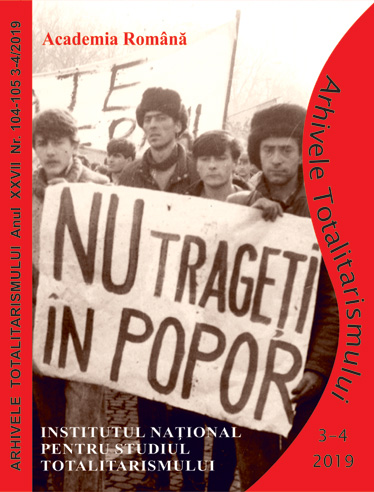Impactul crizei de legitimitate și al „factorului Gorbaciov” asupra prăbuşirii imperiului sovietic şi încheierii Războiului Rece
The impact of the legitimacy crisis and the “Gorbachev factor” upon the breakdown of the Soviet empire and the end of the Cold War
Author(s): Adrian PopSubject(s): History, Political history, Recent History (1900 till today), Post-War period (1950 - 1989), History of Communism, Cold-War History
Published by: Institutul National pentru Studiul Totalitarismului
Keywords: political legitimacy; legitimacy crisis; Gorbachev; East European revolutions; breakdown of the USSR; end of the Cold War;
Summary/Abstract: First, the article unpacks the components which, together, support the right to rule of the powers that be. It argues that political legitimacy comprises basically three elements: the self-legitimacy; the popular legitimacy; and the external legitimacy. Moreover, in the particular case of the Soviet Union, one can delineate two types of external legitimacy: and intra-systemic one, in relation to Socialist countries; and an extra-systemic one, in relation to Western countries. Second, the article discusses the impact of the successive phases of the Soviet regime from Lenin to Gorbachev and of major East European crises upon the crisis of the above-mentioned types of political legitimacy. Third, the article reviews Gorbachev’s major contributions to the geopolitical, socio-political and ideological changes which took place on the European continent throughout 1989-1991, including his metamorphosis from a reformer of the Soviet system into a systemic transformer of it, his abandonment of the “Brezhnev doctrine” accompanied by his non-intervention policy in East European political changes, his dual strategy of keeping momentum for the reformist forces while blocking the capacity to react of conservative forces, his unilateral disarmament measures, his connections and empathy with key Western European leaders and – last but not least – his rapprochement policy vis-à-vis the U.S., which reached its pinnacle at the Malta summit in early December 1989 and put to an end the Cold War.
Journal: Arhivele Totalitarismului
- Issue Year: XXVII/2019
- Issue No: 3-4
- Page Range: 207-228
- Page Count: 22
- Language: Romanian
- Content File-PDF

